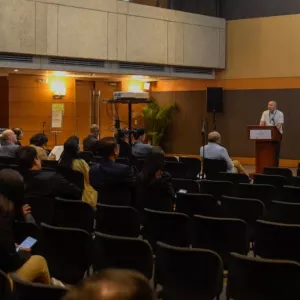A green strategy for accelerating the transformation of sustainable food systems in the Asia-Monsoon region
Manila, Philippines (17 October 2023) – Developing an international collaboration system and disseminating applicable agricultural technologies will contribute to the transformation of food systems in the Asia-Monsoon region, according to The Green Asia Project discussion at the 6th International Rice Congress. The activity, led by the Japan International Research Center for Agricultural Sciences (JIRCAS) and the National Agriculture and Food

A green strategy for accelerating the transformation of sustainable food systems in the Asia-Monsoon region
Manila, Philippines (17 October 2023) – Developing an international collaboration system and disseminating applicable agricultural technologies will contribute to the transformation of food systems in the Asia-Monsoon region, according to The Green Asia Project discussion at the 6th International Rice Congress.
The activity, led by the Japan International Research Center for Agricultural Sciences (JIRCAS) and the National Agriculture and Food Research Organization (NARO), centered on enhancing the production potentials and sustainability of the Asia-Monsoon region using technologies developed to transform the food systems in Japan. The discussion also explored the challenges and opportunities in implementing agricultural technologies in the Asia-Monsoon region.
The Asia-Monsoon region covers eastern, southeastern, and southern Asia where most smallholder farmers cultivate rice paddies under hot and humid climate conditions. The region commonly experiences similar climatic and other environmental stresses that significantly affect the productivity of farming activities. The Asia-Monsoon region accounts for 40% of the global non-CO2 greenhouse gas (GHG) emissions from agriculture.
To help enhance agricultural productivity and sustainability through advanced technologies, Japan’s Ministry of Agriculture, Forestry and Fisheries launched Strategy MIDORI in 2021. MIDORI is a national strategy to achieve sustainable food systems transformation by enhancing production and ensuring the sustainability of the country’s agriculture, forestry, and fisheries sectors.
In line with Strategy MIDORI , the Green Asia Project aims to accelerate the application of agricultural technologies that enhance production potentials and ensure sustainable food systems in the Asia-Monsoon region through the development of an international collaboration system, dissemination of information, and joint research utilizing the network of JIRCAS and other national institutes.
“The technology catalog would be a good start to know scalable technologies which were developed in Japan or through international collaboration over the past 10 years,” said…

